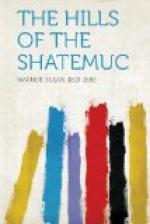The dawn was fresh and fair yet, hardly yielding to day. In utter silence they drove swiftly along the road, through the woods and out upon the crest of tableland overlooking the bay; just above the shore where the huckleberry party had coasted along, that afternoon years before. By the time they got there, the day had begun to assert itself. Little clouds over Wut-a-qut-o’s head were flushing into loveliness, and casting down rosy tints on the water; the mountain slopes were growing bright, and a soft warm colouring flung through all the air from the coming rays of the coming sun. The cat-birds were wide awake and very busy; the song sparrows full of gladness; and now and then, further off, a wood-thrush, less worldly than the one and less unchastened than the other, told of hidden and higher sweets, in tones further removed from Earth than his companions knew. The wild, pure, ethereal notes thrilled like a voice from some clear region where earthly defilement had been overcome, and earthly sorrows had lost their power. Between whiles, the little song sparrows strained their throats with rejoicing; but that was the joy of hilarious nature that sorrows and defilement had never touched. The cat-birds spoke of business, and sung over it, ambitious and self-gratulatory, and proud. And then by turns came the strange thrush’s note, saying, as if they knew it and had proved it,
“WHEN HE GIVETH QUIETNESS, THEN WHO CAN MAKE TROUBLE?”
The travellers had ridden so far without speaking a word. If Elizabeth was sometimes weeping, she kept herself very quiet, and perfectly still. The sights and sounds that were abroad entered her mind by a side door, if they entered at all. Winthrop might have taken the benefit of them; but up to the bend of the bay he had driven fast and attentively. Here he suffered the horse to slacken his pace and come even to a walk, while his eye took note of the flushing morning, and perhaps the song of the birds reached his ear. It was not of them he spoke.
“Do you mean to begin upon the first chapter of Matthew?” he said, when the horse had walked the length of some two or three minutes.
“Yes! — I do” — said Elizabeth, turning her face towards him.
“According to the rules?”
The answer was spoken more hesitatingly, but again it was ‘yes.’
“I am glad of that,” he said.
“Mr. Winthrop,” said Elizabeth presently, speaking it seemed with some effort, — “if I get into any difficulty — if I cannot understand, — I mean, if I am in any real trouble, — may I write to you to ask about it?”
“With great pleasure. I mean, it would give me great pleasure to have you do so.”
“I should be very much obliged to you,” she said humbly.




